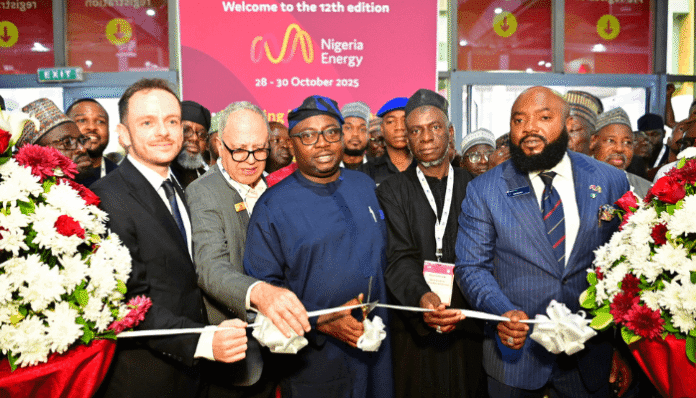More than 8,500 energy professionals, investors, and policymakers gathered in Lagos today for the opening of the 12th edition of Nigeria Energy, West Africa’s largest power and energy conference, as the country’s leaders reaffirmed that private investment will play the defining role in the nation’s energy transition.
The three-day summit, held at the Landmark Event Centre and endorsed by the Federal Ministry of Power, convened government officials, regulators, financiers, and industry executives under the theme “Powering Nigeria Through Investment, Innovation, and Partnership.”
Organised by Informa Markets, the event has evolved into a high-level platform for aligning policy intent with implementation, a critical task for a nation struggling to close its 20,000-megawatt electricity gap and attract capital for long-delayed infrastructure projects.
Opening the conference, Ade Yesufu, Exhibition Director, Energy Portfolio, MEA, Informa Markets, called for Nigeria to accelerate its transition from policy formulation to tangible delivery.
“For over a decade, this platform has brought together the most influential voices shaping the future of Nigeria’s economy,” Yesufu said. “Today, it stands not just as a conference but as a national platform for progress, a meeting point for government, investors, regulators, innovators, and global partners united by one purpose: delivering reliable and sustainable power for Nigeria and for Africa.”
Ambitious reforms and slow execution have long defined Nigeria’s power sector. But recent policy shifts, including the Electricity Act of 2023, which devolves power market regulation to states and enables private participation across the value chain, have begun to attract renewed investor attention.
Delivering the ministerial address, Adebayo Adelabu, minister of power said the government’s energy strategy is now centred on private capital, competitive markets, and state-led innovation.
“Nigeria stands at a historic turning point in its energy transition journey,” Adelabu said. “With the Electricity Act 2023, we are unlocking state-led power generation, decentralised energy markets, and increased private sector participation.”
He noted that the ministry’s agenda is tightly aligned with President Bola Ahmed Tinubu’s Renewed Hope Agenda, which aims to revitalise the economy through enterprise, innovation, and shared prosperity.
“The reforms underway are designed to open new doors for investment while improving reliability and access across all levels,” Adelabu added. “Our goal is to build a power sector where collaboration, innovation, and transparency drive lasting progress.”
Nigeria’s power grid currently has an installed capacity of around 13,000 megawatts, but only 5,000 to 6,000 MW is typically available due to transmission constraints, gas shortages, and underinvestment. The government estimates that the country needs to quadruple its available capacity over the next decade to meet demand from households and industries.
Representing Governor Babajide Sanwo-Olu, Biodun Ogunleye, Lagos State Commissioner for Energy and Mineral Resources, underscored the critical role of states in driving the country’s power reforms.
He highlighted the Lagos State Electricity Law 2024, recently enacted to create a decentralised and investment-friendly energy market.
“With this law, Lagos has made it clear that we are ready to take on a significantly larger role in reforming and restructuring our power sector,” Ogunleye said. “Our vision for Lagos is straightforward — to be a shining example of a 21st-century city, powered by reliable, affordable, and clean energy.”
The new law establishes a state-level independent system operator, regulatory framework, and mechanisms to attract private participation in generation, transmission, and distribution. The state government aims to expand access and reliability for its more than 20 million residents, who currently depend heavily on diesel generators and small-scale solar systems.
Throughout the day, panels and leadership dialogues explored how Nigeria can bridge the gap between reform and results.
Sessions on public-private partnerships (PPPs), electricity market reforms, and financing innovation emphasised that achieving sustainable power development requires clear regulatory frameworks and investor confidence.
Speakers from utilities, financial institutions, and technology firms discussed how aligning policy reforms with financing tools could de-risk projects and accelerate capital inflows.
“Private capital will not flow into uncertainty,” said one panellist from a leading regional development finance institution. “Investors need clarity on tariffs, contract enforcement, and liquidity, and that’s what the Electricity Act and new state laws are beginning to provide.”
Another recurring theme was the need for stronger coordination between federal and state agencies, especially as subnational governments begin to establish independent electricity markets under the 2023 Act. Experts noted that coherence between wholesale and retail markets will be vital to avoid regulatory fragmentation.
The discussions also spotlighted energy efficiency as a key pillar of Nigeria’s energy transformation. Experts urged the government to adopt clear efficiency standards for industries and households, while promoting technology-driven solutions to reduce system losses and improve service delivery.
Participants emphasised that innovation, from distributed solar systems to digital grid management and battery storage, must complement large-scale infrastructure investments to ensure reliability and resilience.
Nigeria’s energy market has attracted growing attention from private developers and multilateral financiers in recent years. The World Bank, African Development Bank, and U.S. International Development Finance Corporation are all backing projects aimed at expanding access, while local investors are increasingly venturing into distributed power and renewable energy ventures.
However, persistent challenges remain, including liquidity constraints, gas supply bottlenecks, and currency risks. Industry executives at the conference agreed that sustained policy consistency, investor protection, and enforcement of market discipline will determine whether Nigeria’s reforms succeed.
Adelabu said the Federal Government remains committed to creating “an enabling environment for investment and innovation” and to ensuring that reforms translate into tangible improvements for consumers and businesses alike.
Source: Business Day




